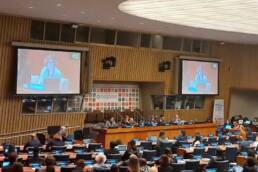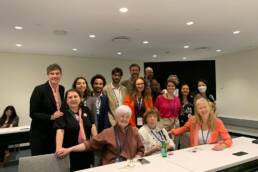The International Trade Union Confederation (ITUC) has submitted its demands to the UN High-level Political Forum on Sustainable Development (HLPF) set out in the report ‘A New Social Contract for a Gender-Transformative Agenda’.
This year’s HLPF is taking place in a context of multiple crises: Global inequality, worsening environmental degradation, a global pandemic and the rising number of conflicts. All of them are threatening the world’s sustainability and the United Nations is now talking about “rescuing the SDGs”.
In their role as a UN Major Group and as actors in development in their own right, trade unions have lined up policy priorities for the SDGs (Sustainable Development Goals) that are under review this year. These priorities provide guidance to redress the current trend and bring the 2030 Agenda to safe haven by 2030.
“We know what is at stakes and what needs to be done. The world has enough knowledge, technology and resources to get the SDGs back on track. What we need now is the political will to act. The 2030 Agenda, along with the UN General Secretary’s report Our Common Agenda and the Global Accelerator, must set the blueprint,” said ITUC General Secretary Sharan Burrow.
A new social contract with SDG 8 at its centre
The ITUC submission to the HLPF frames its recommendations both on worker’s demands for a new social contract (green jobs with just transitions, rights, social protection, wages, equality, and inclusion) and on the results of the ITUC’s SDG 8 Global Monitor. This tool shows the leverage role of SDG 8 in advancing the other goals of the 2030 Agenda, including the goals the HLPF will focus on this year (Goal 4 on access to education; 5 on gender equality; 14 on life below water; 15 on life on land; and 17 on partnerships to achieve the goals).
- Read the recommendations in the ITUC’s submission to the HLPF 2022: A New Social Contract for a Gender-Transformative Agenda.
- Join the ITUC high level event taking place on July 11 here.




